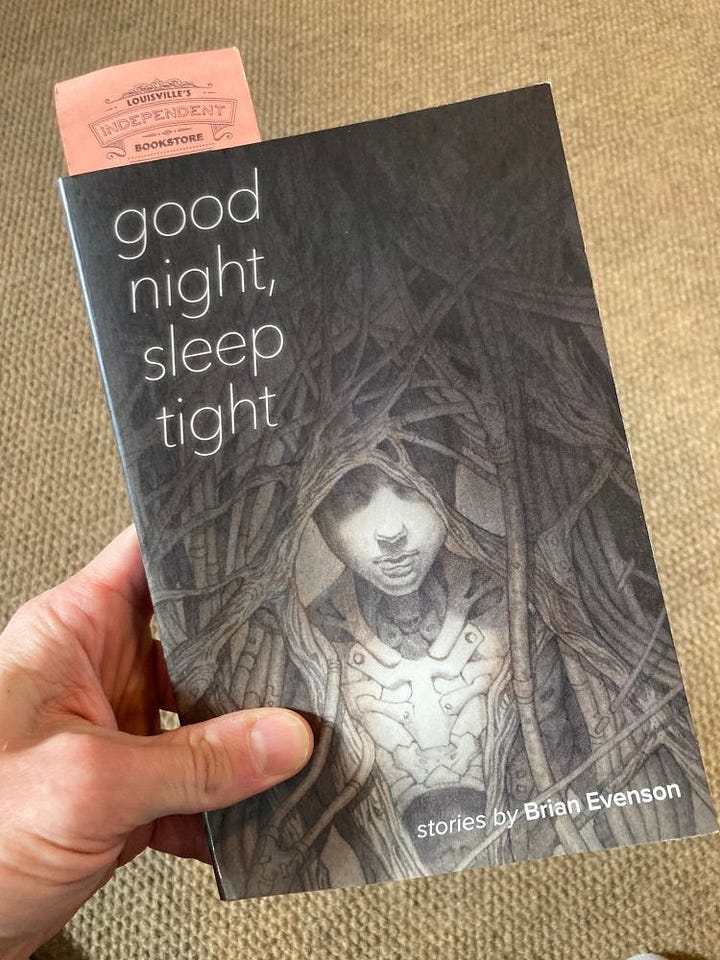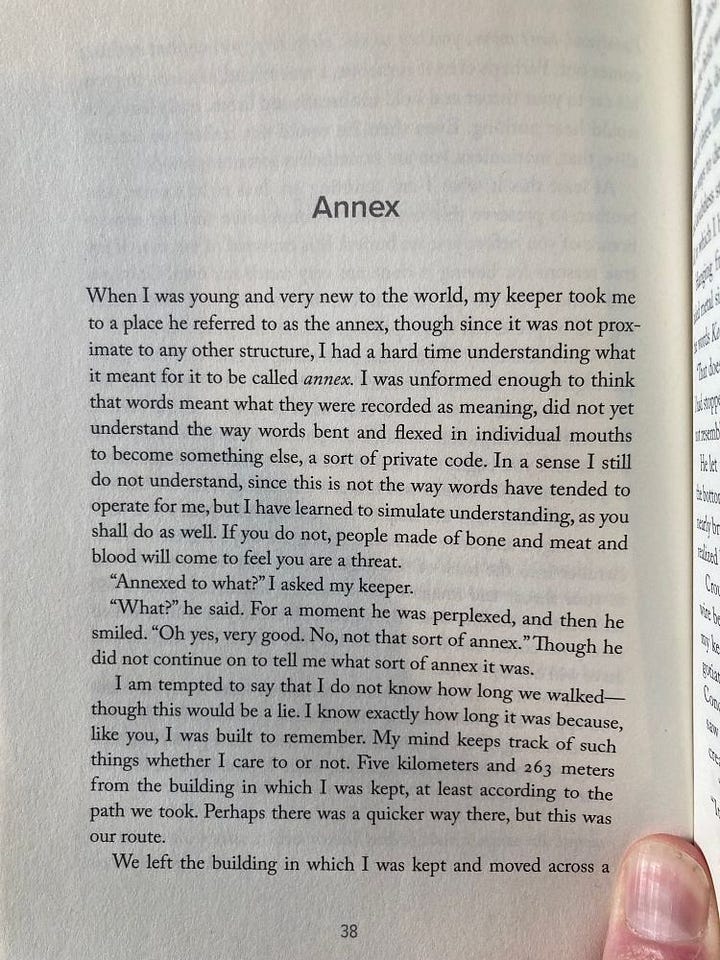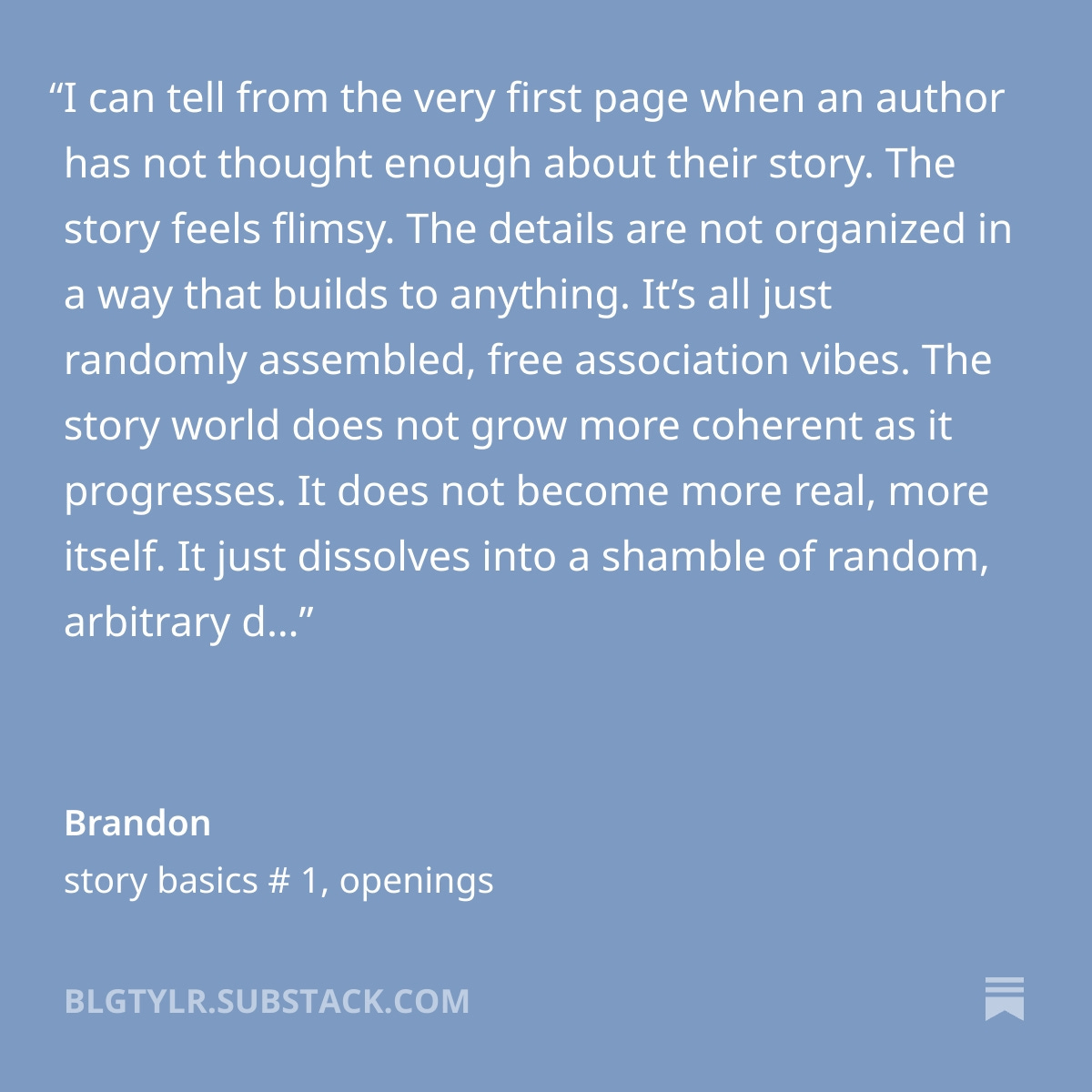2025 week 11 reading log, plus some thoughts on teaching & beginnings
Yiyun Li, Brian Evenson, Lorrie Moore, Rita Bullwinkel, William Maxwell, Miranda July...
I’ve been thinking a lot this last week or two about beginnings.
*
A couple weeks ago, we had completed the first round of workshop in my advanced fiction class and we had a few classes before we were schedule to start cycling back through again for round two. I filled those classes with a few “craft” days, including one of my favorite class activities:
I made a copy of the first page of every story from this year’s Best American Short Stories, and then I photocopied and made packets of all 20 of those first pages. I handed those out to my students, and we spent class reading a handful in real time and discussing how they work as beginnings/first pages. Which ones we wanted to keep reading, why we wanted to keep reading. What they were setting up for the story as well as for us as readers.
It’s a fun exercise.
*
A couple weeks ago,
Taylor wrote about beginnings.The whole post is really smart and great, as is his follow-up on “situation.”
I like Brandon because he’s so smart and because we have a lot of overlap in taste and opinions about fiction… and also because I think we have a lot of different tastes and opinions and it’s fun to disagree with him (sometimes to him, sometimes just in my head (hi Brandon :))), in ways that sometimes it’s just fun to disagree with someone but also in ways that disagreements can sometimes help clarify and crystallize your own opinions.
Anyway. This quote especially grabbed me:
It reminded me how, probably 99% of the time, I can tell from the very first page if I am going to accept or decline a submission.
I sometimes feel a little hesitant to say it like that, probably a little because it feels kinda disheartening to submitters, but probably even moreso because I think it is easy to have the wrong takeaway. To think that your opening needs to be BIG or SPLASHY or whatever.
Brandon touches on that, too:
A good opening is not about a memorable first line or because you begin with action. You cannot trick your reader into thinking your work is great by deploying strategies developed by ad agencies at the midcentury.
For me, what I’m really looking for is confidence. For the first page to feel confident in itself. To feel like it knows itself. It knows the story come. To feel like I’m in the confident hands of a writer who wrote a story that I’m gonna need to keep reading.
Although, even that… I’m not really “looking” for that. It’s more I just feel it. An I know when I see it kinda thing. I know it when I feel it, and I don’t stop and think about if the opening is or isn’t working because, instead, I just want to keep reading. Often, if the first page of a submission really grabs me, a part of me is already starting to feel excited to publish it and get to share it with readers and for them to feel the excitement that the story is already instilling in me.
*
A couple years ago I taught an upper level cnf class, “Writing About Joy.” One of the best classes I’ve taught. In addition to weekly assigned readings and workshop, we used
’s Book of Delights as a kind of spine for the class. In addition to reading ~5 “delights” every week, every week they had to write one of their own. I think it may have been the first time I’d assigned a short, weekly, informal creative prompt. If it wasn’t the first, it was the first that was a success.It was such a success. A handful of students ended up expanding or using those short delights for longer essays, and even more than that, they often noted just how much they’d enjoyed the assignment. On a writing level, but maybe even moreso on a human level. It made them notice more delight and joy in their lives and in the world. It was a real treat of a semester.
*
Those weekly creative prompts were such a success, I’ve done versions of them the last couple of times I’ve taught advanced fiction. I tell my students, in class as well as on the homework prompt itself, “This is intended to get us writing (and thinking, and experimenting, etc.) and to be as low-stakes and minimal pressure as possible. There is no wrong or right way to do it. Be playful, have fun with it.”
And so, after doing that class exercise with the BASS story first pages, the creative prompt I gave them was to write three openings to stories.
*
What all that has really had me thinking a lot about this last week or so is beginnings with drafts.
Drafts are often full of cliches and lazy phrasings and too vague descriptions and boring language. Drafts should have cliches and lazy phrasings and too vague descriptions and boring language! That’s what they’re for. To get it all down. To give yourself material to work with.
I think that, or a version of that, is especially true for beginnings, and getting yourself started.
Back to Brandon. He ended his post like with this… encouragement/challenge/instruction:
Here is an exercise. The next time you set out to write a story—ask yourself the six questions:
Who is this person or who are these people?
What is going on in their life or lives?
What is their motivation?
What is their dilemma?
What is the situation of the story?
What is the moment of the story?
Do not write anything—not a scene, not an image, not a line until you have come up with answers to these questions. When you have answered them. Write a scene that typifies and concretizes that information. Just one scene.
I started to write up a disagreement, but then basically what I was actually writing was agreement. Asking myself questions makes me feel itchy and feels like a turn-off w/r/t writing, but those questions are basically what I was getting at, it turns out.
What happens, too often, in student/beginning writer drafts is an opening in stasis. Too much thinking, noticing, wondering. Nothing that opens up into story.
What I want from the beginning of a draft — for myself, for my students — is to give yourself as much “material” to work with.
What does that mean? Something about who the person/people are. Some kind of place where this is happening. Something concrete! A relationship, an actual place, and action. Something happening. Some kind of complication. A few complications! Something messy. Just throw it all in the first paragraph, or the first few, and then see what happens.
*
Hm.
I don’t actually have much interest in writing these kinds of craft posts. I started this blog to keep a log of the stories I read every morning, and now I’ve fallen into the trap of spending a few hours working on… this. Whatever this is. I don’t even really know! I don’t know if anything here is interesting. I don’t even know if I agree with everything I just wrote!
I probably could (should?) have spent this time on a story or my novel, but so it goes. This was still writing. And I bet I’ll be a better teacher next week, for having thought about all this some through writing. I’ll probably be a better writer next week because of it, too.
the stories I read this week:
Sat. 3/15: “Techniques and Idiosyncrasies” by Yiyun Li
This story didn’t really do anything for me. That said, my primary takeway was still that there can be a benefit to reading a story like this and be reminded what does and doesn’t connect with you.
*
Sun. 3/16: n/a?
Mostly every day I make a to-do list, and the first item on every day’s list is “• story” and that bullet point under this day is x’ed out but there isn’t a story title next to it, so… either I didn’t read a story and I’m a liar to myself on my own to-do list, or I read one but didn’t note it down and now have already totally forgotten which story, or, and I’m kinda thinking this is most likely, I read a bunch of Short Story, Long submissions and “counted” that as my story reading for the day.
*


Mon. 3/17: “Annex” by Brian Evenson
This one was a little more “sci-fi-y” than my personal tastes… although also, of course, super “Evenson-y,” and so even while not being my fave, it’s great.
And also, just, man, Evenson can find language and story in sentences kinda unlike anyone else.
I was unformed enough to think that words meant what they were recorded as meaning, did not yet understand the way words bent and flexed in individual mouths to become something else, a sort of private code.”
*
Tues. 3/18: “Paper Losses” by Lorrie Moore
Kinda like the above Evenson story, I’ve been reading a decent amount of Moore the last few weeks, and this one actually wasn’t a fave, but even “not my fave Moore” is better than almost anything else. Amazing WAR numbers on these two.
And I’ve been thinking about this sentence the whole rest of the week:
That yumminess obscured the mind of the yummy as well as the mind of the yummer.
*
Wed. 3/19: “God’s True Zombies” by Rita Bullwinkel
This is the… fifth story I’ve read from Bullwinkel’s collection, Belly Up, and I haven’t really loved any of them. I LOVED her novel Headshot, which I read last month, but these aren’t connecting with me. Probably gonna bail and return it to the library… though if anyone is reading this, and read this collection, and has any faves: point me to them!
*
Thur. 3/20: “Love” by William Maxwell
A solid, quiet, quick ~3-page story. I picked up Maxwell’s collection, either used or from the free bookshelf in my English Department, I don’t remember, and this is my first little wade in. I’m excited to read more.
*
Fri. 3/21: “The Sister” by Miranda July
Probably my least fave July I’ve read in this collection so far.
And now, typing that up, and typing up this whole log for the week… HUH.
Some good stories, some misses, but none of them super stand out.
It didn’t necessarily feel like an off week of reading, but it did kinda just feel like something of an off week in general. Maybe a week of reading without one standing out as a real BANGER had some ripple effects?
Here’s something I wrote this week:
I didn’t write last Friday, and I didn’t write today either.
It’s that point in the semester. Which isn’t an excuse, but also is. I coulda made time to write. But I’m behind on grading and I wanted to just read some and I wanted to watch the new episode of Severance with my gf because we’re going out tonight and didn’t want it spoiled and also I’m just kinda worn out. Week 11 of the semester tends to have that effect!
I sometimes don’t write at all during the semester, and often barely write, but I wrote every Friday up until now, culminating in 13k words of a new novel, and that’s pretty good, so I’m trying to keep in mind that that’s a win.
That said… I DID actually write a little this week!
Hex opened for submissions on Monday.
Hex is one of my fave journals. They’ve published me twice!
I wanted to submit something but don’t have anything but got an idea, so spent Monday in between classes and then also Monday evening ignoring grading and class prep and (kinda) my girlfriend and life and focused and wrote a new short 800 word story. Pretty stoked with how it turned out. I sent it to a couple buddies and DT said, “I dig this. Some real Evenson vibes mixed with a hint of typical Burch.” I’ll take it! And, as logged above and in previous logs, I’ve been reading Evenson lately, and so of course there’s some of those vibes. His influence is (almost too!) strong! We’ll see if hex likes it or not. No worries if not! It prompted both an idea and me to sit down and make myself write!
I started this post talking about beginnings, and have been ending every post by sharing a little of what I wrote that week, and so here’s the beginning of this new story:
Some kind of a noise. Or a nudge, a push.
Probably both. A “Babe, babe,” together with or followed by, enough of a jostle to wake me up while trying not to startle me.
“Sorry,” Michelle said. “I didn’t mean to wake you.”
I felt like I’d been awoken mid-dream, like maybe even the dream had woken me.
“I mean… I guess I did mean to wake you. But I was trying to wake you without startling you.”
I startle easily. I gasp, my body jolts; everything a sudden burst of confusion.
I couldn’t remember my dream. Lost to the startle.
“Do you hear that?” Michelle said.
I looked at the clock. 2:41 a.m.
“There’s something in the attic,” she said. “I think it’s a squirrel.”
I looked at Michelle. My what am I supposed to do about it look.
She gave me her you’re supposed to go fix it / take care of it / at least go check on it look back.
“You’re supposed to go fix it,” Michelle said. “Take care of it. Check on it. Get it out of there, ideally.”
*
Thanks for reading. Any fave reads of your own this week?
—Aaron






Nice, Aaron! I enjoyed your thoughts on craft here. An engaging take on getting started with a story.
Also, I really enjoy Maxwell's longer works. I have not read many of his shorter works. Your post has inspired me to break out my collection and go further into it.
I like how you weaved Brandon and BASS and teaching in this. I thought Brandon’s posts were so rich. I like your teaching with the BASS first pages. This year I actually read all of them (I listened to some like “Privilege” and “Democracy in America “ on the audio version from my library) and what struck me was the endings. Not only was there a twist but the final line added another layer or kept it going past the finish. JCO’s “Feeding Frenzy” in this week’s New Yorker was just like that. Maybe it’s fitting you ended this post with an ending. Best of luck on this piece and your writing.